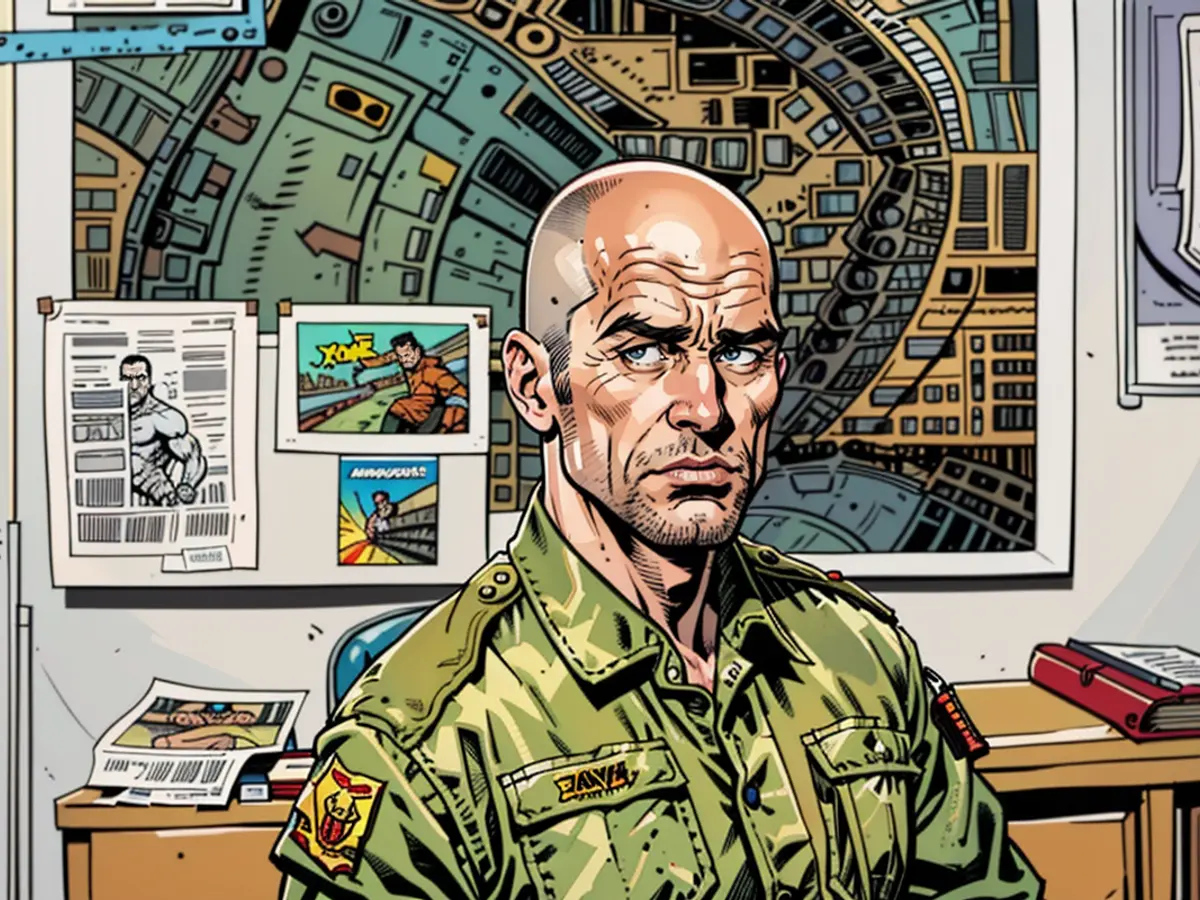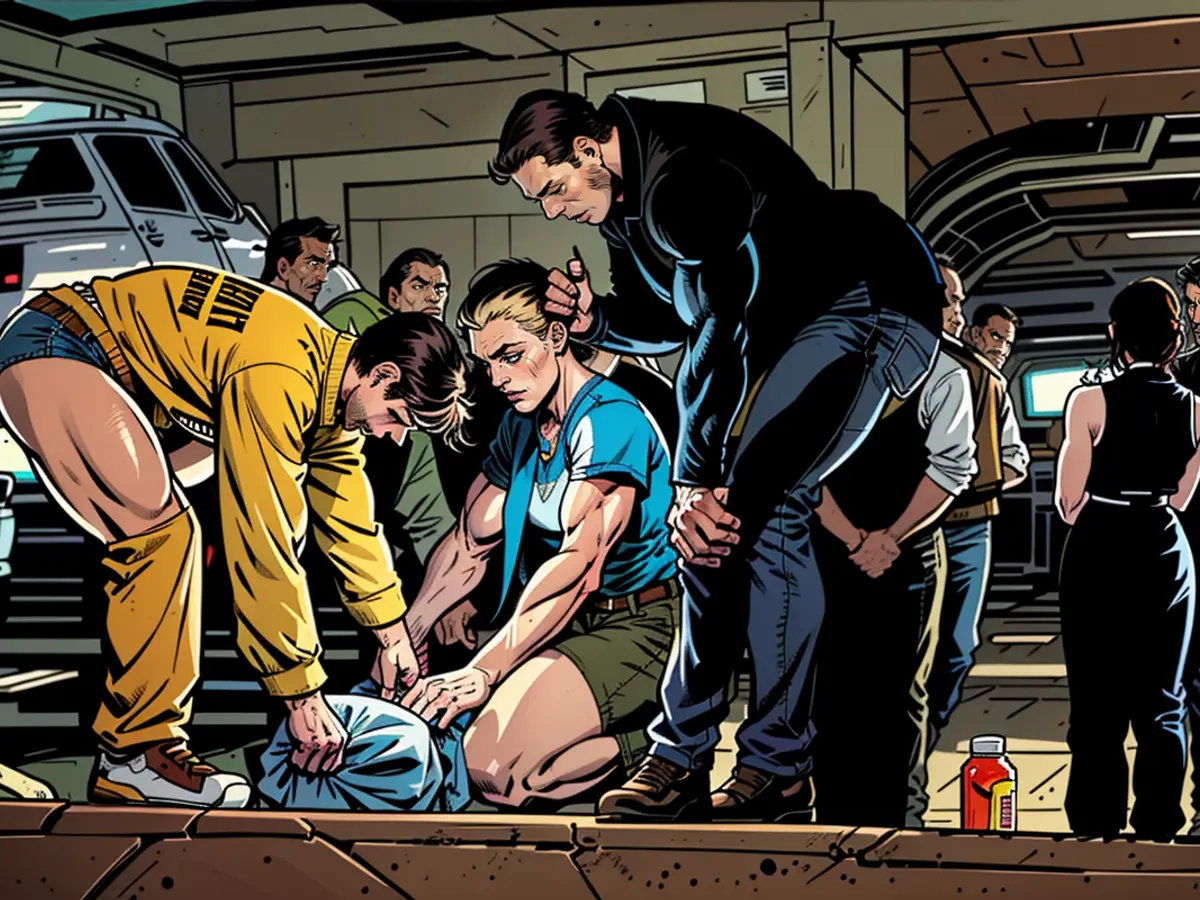Russia's hybrid war against the West is intensifying
A production site of the arms company Diehl catches fire, then it becomes known that a plot to assassinate Rheinmetall-CEO Papperger was planned. Colonel Markus Reisner on the dimensions of hybrid warfare, and why the Ukrainians are still not able to use their US weapons as much as they want to in this regard.
ntv.de: Colonel Reisner, along the entire front, Russian troops are attacking intensively. But at the small town of Nju-York, north of Donetsk, the situation seems particularly dramatic. What's going on there?
Markus Reisner: The Russians are operating here in a similar way as we have seen in Avdiivka and near Soledar in the vicinity of Bachmut. They have advanced through an underground pipeline, a tunnel, deep behind Ukrainian positions. Then they attacked from the rear and took control of the area.
And that was a pipeline large enough for a troop to pass through?
The mining regions of Donbass are crisscrossed with underground tunnels, concrete pipelines, and subterranean channels and shafts. These installations are useful for covert and clandestine operations. This tactic reminds me of the mining operations of the Ottomans in the 17th century or the work of pioneer troops in World War I. Here, battles were fought under siege and at stalled fronts underground. One tried to surprise the enemy behind their lines.
What are the consequences now?
The Russians could succeed in encircling the well-fortified Ukrainian defensive positions. If so, the Ukrainian army might have to abandon their positions there, and the Russians could then take more territory. We also see that the Russians are attacking from the air with heavy glide bombs. One such bomb can wipe out an entire stronghold. The Ukrainians are fighting a threefold defense. Underground, on the surface, and in the air.
General Kyrylo Budanov of the Ukrainian army has mentioned again that there is a possibility of another Russian attack from the North. Do you see any signs of this?
Yes, the Russians could attack between Sumy and Kharkiv. This would force the Ukrainians to deploy additional forces there. The front would be even more extended. The signs I see: We keep seeing smaller Russian reconnaissance troops crossing the Ukrainian border. This could be a prelude to a larger offensive. Furthermore, in the past two weeks, the Russians have intensified their reconnaissance deep behind the front lines. They keep reporting the destruction of Ukrainian medium-range air defense systems, such as Iris-T...
... the air defense system of Diehl Defence, which Germany provided to Ukraine quite early.
There are videos about these reports, but it is not clear from them whether they show actual Iris-T systems or just replicas. The same applies to the alleged destruction of HIMARS systems. In the past few days, the Russians have posted seven videos on social media that allegedly show the destruction of HIMARS. But it could also be replicas.
What role do replicas play in the relationship between the two parties?
With a decoy, the enemy is lured into using valuable and potent weapons for destruction. For instance, let's take the Iskander missile system. The Russians produce this valuable missile system in a certain quantity per month. It's a success for Ukraine if the Russian side wastes an Iskander for an attack on a decoy. However, the Russians try to film such an attack with drones to show how effectively they destroy enemy systems. In my opinion, there are only a few videos that actually show the destruction of powerful Ukrainian weapon systems. For example, when two launchers of a Patriot battery were hit a few months ago, there were detailed results that could be analyzed. However, this is not the case with the current videos. There are four Iris-T systems in use in Ukraine. So far, none of them has been destroyed.
When we look at the latest American weapons package that the Republicans in Congress have been blocking for so long: How effective is its impact at the front now? Is the American contribution to this help truly decisive?
I would like to divide these deliveries into offensive and defensive weapon systems. In offensive weapon systems, we can at least see a measurable effect in a region. For example, the use of ATACMS or HIMARS rockets on the Russian side, north of Kharkiv, has noticeably caused the Russian offensive to lose momentum. In part, it has even come to a standstill on operational level for the Russians, as it allows them to tie down Ukrainian forces. However, in the Donbass region, we do not see any effect, the momentum is still on the Russian side. And the offensive US weapons are still limited in their effectiveness due to the White House's ban on using them on Russian territory more than 100 kilometers deep.
Was this a topic at the NATO summit? After all, the Ukrainian President Volodymyr Zelenskyy, US President Joe Biden, and a multitude of security advisors were all present...?
Zelenskyy spoke with Biden about this at the summit and asked for the restrictions on the use of American systems to be lifted. They could not agree, and this must have caused great frustration on the Ukrainian side. In defensive weapons, more movement has occurred.
In what way?
Due to the heavy strategic air raids that Russia conducts in Ukraine approximately every 14 days, the pressure has become unbearable. In addition, there are such terrible attacks as the one from the past week against the children's clinic in Kiev. Therefore, the NATO has managed to supply additional medium and long-range systems like Iris-T and Patriot batteries. However, it still does not suffice to protect the entire territory of Ukraine, as there are still far too few air defense weapons. As a result, the Russians are still able to hit critical infrastructure, as they conduct their attacks on a very high level. And it seems that it always takes a crisis to move the West to further deliveries.
If we consider this with common sense: Isn't it more sensible to use defensive weapons to shoot down every Russian rocket or at least try to, instead of using offensive weapons against a runway from which Russian fighter jets take off and then launch missiles or drop bombs?
So it is. Zelenskyj referred to an attack on a children's hospital in Washington and requested permission for Ukraine to carry out offensive measures with a defensive goal within that area. This would allow for targeting launch sites with rockets and preventing jet bombers from taking off. However, this resulted in no success. Currently, the Ukrainian army is only authorized to attack Russian gatherings up to 100 kilometers behind the front lines. They use long-range drones for attacks on air bases. However, we have not yet seen measurable results, such as a significant decrease in Russian bombardments.
Parallel to the NATO summit, it was made public that an assassination plot against Rheinmetall CEO Armin Papperger was thwarted. What significance does hybrid warfare have in Russia's conflict with the West at present?
Russia has become increasingly active in NATO territory in recent years. Already before and after 2014, there were attempts to destroy munitions depots in Bulgaria and the Czech Republic in the air, some of which were successful. There was an attack in Lovnidol, Bulgaria, in 2011, and two GRU attacks in Vrbětice, Czech Republic, in 2014. An attempt was made at Karnobat in Bulgaria in 2023. The attack on the ex-agent Sergei Skripal with the nerve agent Novichok six years ago was also hybrid warfare, as was the Tiergarten murder in Berlin in 2019. Over the past few months, the hybrid war against the West by Russia has once again intensified. The alleged assassination plot against a representative of the German arms industry, as seen from my perspective, shows how tense the situation is.
Are there any other recent examples?
In February, a Russian helicopter pilot defected who was in the Ukrainian conflict. He defected to Ukraine, was taken to the West, and eventually landed in Spain. He was allegedly murdered there by a Russian agent team.
Does the Kremlin use old connections it still has in the West for such actions?
During the Cold War, the Soviet Union built an extensive network of agents, spies, and deliberately working intelligence officers. With the collapse of the Soviet Union, this network was not destroyed but many were continued to be guided by Russia, and the Kremlin tried to expand these structures further. To this day, spies are regularly uncovered in Western defense ministries. In addition, the Russians pursue specific goals with regards to attacks against defense industries that produce important goods for Ukraine. The alleged assassination plot against Armin Papperger is just one of many examples. We must be aware that we are already in a hybrid war with Russia. A war of covert attacks, disinformation campaigns, and espionage.
Interview with Markus Reisner by Frauke Niemeyer
- In response to the intensified Russian attacks in Donbas, President Zelenskyy had a discussion with President Biden at the NATO summit, requesting the lifting of the restrictions on using American weapons beyond 100 kilometers from the Ukrainian front lines.
- Despite the delivery of offensive weapons like ATACMS and HIMARS from the United States, their impact is not as significant in the Donbass region as in other areas, mainly due to the White House's range restrictions.
- General Budanov expressed concerns about a potential Russian attack from the North, between Sumy and Kharkiv, which could force additional Ukrainian forces to deploy, extending the front line even further.
- Colonel Reisner mentioned the importance of defending critical Ukrainian infrastructure from Russian attacks, pointing out that the current number of air defense weapons supplied by NATO falls short of protecting the entire country from Russian airstrikes.









